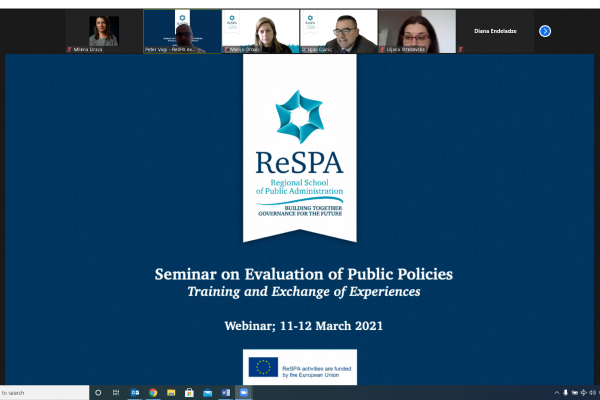
Evaluation of Public Policies,a seminar devoted to the evaluation sequence of the policy development cycle
In the light of introducing a systematic policy evaluation in the Western Balkans (especially those related to their public administration reform frameworks), the two-day seminar was organized as a continuation of the ReSPA seminar on monitoring and reporting held in October 2020.
The seminar deeply dived into the evaluation sequence of the policy development cycle, general concepts of evaluation, some specific aspects and technicalities of good evaluation design and execution, as well as good international practices on these aspects.
Designed as a mixture of knowledge transfer and capacity building through conceptualization, practical examples and exercises, the seminar enhanced the knowledge of participants on the main aspects of policy evaluation and offered a platform for the facilitation of discussion amongst civil servants on recent developments in policy evaluation, as well as on key challenges and how to overcome them. Also, it provided an opportunity for detecting the topics and ideas for further ReSPA actions in this area of work. Organization of the capacity development activities that will provide common lessons in the Region on the public policy development cycle are recognised as one of the important potentials for future progress in this field.
In his introductory speech, Mr Dragan Đurić, ReSPA Programme Manager – Coordinator, emphasized the need for detecting the areas within policy monitoring and evaluation that can be improved under ReSPA's umbrella. He also invited participants to discuss further development of the activities devoted to the quality of policy planning processes. "Overarched quality of evidence-based policies development and policy's cycles are essential especially for the public administrations' structures which have a coordination role in the central government institutions. The coordination of public policies is one of the highly-prioritizes topics for ReSPA. To provide the baseline for the further development of the policy coordination, ReSPA is developing a comprehensive study which will be published on our website in upcoming weeks" said Mr Đurić.
On the first day of the seminar, Mr Peter Vagi, ReSPA expert, introduced the participants to the importance of the conceptual positioning of policy evaluation in the policy management cycle. He also presented the similarities and differences between policy evaluation and monitoring and the prerequisites for effective evaluation (why sound planning is a pretext for evaluability, why do we need good outcome- and result-level indicators). Mr Vagi focused on the purpose and approaches, evaluation questions, roles, responsibilities, processes and success factors for evaluation and advised the participants on how to formulate good evaluation reports to various audiences and how to use reporting smartly for accountability, learning and policy (re)design purposes.
On the second day, Mr Vagi facilitated a fruitful discussion about the WBs current practices with policy evaluation. The participants gave their opinion on the national frameworks and obligations for policy evaluation, they also provided the recent examples of evaluations within PAR and other sectors and emphasized the key challenges with evaluation as well as expectations and plans for the future.
Mr Martins Krievins, OECD/SIGMA Senior Policy Advisor and Kety Tsanava, head of Public Administration Division in the Administration of the Government of Georgia presented the case of the "PAR review" in Georgia as an international example of good practice useful for the Western Balkans.



